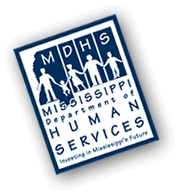 |
Division
of Child Support Enforcement |
|
| Employer Information | ||
To report electronically, click here http://www.ms-newhire.com |
||
|
|
|
Mississippi New Hire Reporting According to Federal and Mississippi State laws 43-19-46 and 93-11-101, all employers (or independent contractors) are required to report basic information about newly-hired personnel to a designated state agency within 15 days. This legislation was enacted in 1996 under the Personal Responsibility and Work Opportunity Reconciliation Act (PRWORA). New Hire information collected from employers is matched with State and National data to help collect child support through income withholding. A penalty of $25.00 per case (incident), or up to $500.00 for collusion between employer and worker, shall be assessed for not reporting as directed by law. The Division of Child Support Enforcement sends withholding orders automatically to the noncustodial parent's employer/payor when there is a match in the New Hire Directory. To obtain more information, please use the following address: Mississippi
State Directory of New Hires
Central Receipting and Disbursement Unit As a mandate of the Personal Responsibility and Work Opportunity Reconciliation Act (PRWORA), all states are required to establish a State Disbursement Unit (SDU). This unit is the repository for all child support income withholdings and makes required child support disbursements. In Mississippi, this unit is called the Central Receipting and Disbursement Unit (CRDU). All withholding payments directed to the Mississippi Department of Human Services must be mailed to the following address: CRDU Each payment remitted must include the noncustodial parent's name, social security number, amount withheld and employer name. Withholding Orders/Notices from Other States As of January 1, 1998, all states were required to adopt the Uniform Interstate Family Support Act (UIFSA). By adopting this law, each state agrees to abide by the same rules and procedures for interstate child support cases. Previously, child support agencies relied on a two-state process to locate parents, establish orders and enforce the financial obligations owed by a parent. The old process was extremely slow and complicated because laws and procedures varied State-by-State and even county-by-county. One of the cornerstones of UIFSA is direct income withholding. Direct income withholding involves sending an income withholding order across State lines to a noncustodial parent's employer in another State. While income withholding for child support is not new for employers, receiving them directly from another State may be new.
If you comply with these basic requirements, you will not be subject to civil liability to an individual or agency with regard to your withholding of child support from the employee's income. What is the maximum amount that can be withheld? For all garnishments and income withholdings, the upper limit on what may be withheld is based on the Federal Consumer Credit Protection Act (CCPA). The Federal withholding limits for child support and alimony are based on the disposable earnings of the obligor (i.e., the employee).
Multiple Child Support Orders for the Same Employee. You must add together the current support owed for each order and withhold that amount first. If this amount does NOT exceed the CCPA or appropriate State law, you may withhold additional earnings for any arrears, provided the total amount withheld does not exceed the amount available under the CCPA or appropriate State law. If only one withholding is for arrears only, withhold an amount up to the CCPA limitation. If there is any question as to the amounts to be withheld in a particular case, you may call the county Child Support office handling the case and speak to the case worker. May we combine child support payments from several employees? You may send one check for each pay period to cover all child support withholdings for that pay period if they are all to be sent to the Mississippi Department of Human Services, provided you itemize the amount withheld from each employee, the date each amount was withheld, and the noncustodial parent's social security number. Is medical insurance required to be provided when the child does not live in the service area? Yes. By law, medical insurance coverage available to the parent-employee cannot be denied to a child even though:
Under which insurance plan should the child(ren) be enrolled? Enroll the child(ren) under the same health benefit plan in which your employee is enrolled. If the employee is offered more than one health plan, the plan chosen by the employee must provide coverage for dependants. |